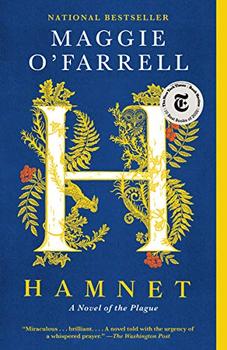Summary | Excerpt | Reading Guide | Discuss | Reviews | Beyond the Book | Readalikes | Genres & Themes | Author Bio

Excerpt
Hamnet
A boy is coming down a flight of stairs.
The passage is narrow and twists back on itself. He takes each step slowly, sliding himself along the wall, his boots meeting each tread with a thud.
Near the bottom, he pauses for a moment, looking back the way he has come. Then, suddenly resolute, he leaps the final three stairs, as is his habit. He stumbles as he lands, falling to his knees on the flagstone floor.
It is a close, windless day in late summer, and the downstairs room is slashed by long strips of light. The sun glowers at him from outside, the windows latticed slabs of yellow, set into the plaster.
He gets up, rubbing his legs. He looks one way, up the stairs; he looks the other, unable to decide which way he should turn.
The room is empty, the fire ruminating in its grate, orange embers below soft, spiralling smoke. His injured kneecaps throb in time with his heartbeat. He stands with one hand resting on the latch of the door to the stairs, the scuffed leather tip of his boot raised, poised for motion, for flight. His hair, light-coloured, almost gold, rises up from his brow in tufts.
There is no one here.
He sighs, drawing in the warm, dusty air and moves through the room, out of the front door and on to the street. The noise of barrows, horses, vendors, people calling to each other, a man hurling a sack from an upper window doesn't reach him. He wanders along the front of the house and into the neighbouring doorway.
The smell of his grandparents' home is always the same: a mix of woodsmoke, polish, leather, wool. It is similar yet indefinably different from the adjoining two-roomed apartment, built by his grandfather in a narrow gap next to the larger house, where he lives with his mother and sisters. Sometimes he cannot understand why this might be. The two dwellings are, after all, separated by only a thin wattled wall but the air in each place is of a different ilk, a different scent, a different temperature.
This house whistles with draughts and eddies of air, with the tapping and hammering of his grandfather's workshop, with the raps and calls of customers at the window, with the noise and welter of the courtyard out the back, with the sound of his uncles coming and going.
But not today. The boy stands in the passageway, listening for signs of occupation. He can see from here that the workshop, to his right, is empty, the stools at the benches vacant, the tools idle on the counters, a tray of abandoned gloves, like handprints, left out for all to see. The vending window is shut and bolted tight. There is no one in the dining hall, to his left. A stack of napkins is piled on the long table, an unlit candle, a heap of feathers. Nothing more.
He calls out, a cry of greeting, a questioning sound. Once, twice, he makes this noise. Then he cocks his head, listening for a response.
Nothing. Just the creaking of beams expanding gently in the sun, the sigh of air passing under doors, between rooms, the swish of linen drapes, the crack of the fire, the indefinable noise of a house at rest, empty.
His fingers tighten around the iron of the door handle. The heat of the day, even this late, causes sweat to express itself from the skin of his brow, down his back. The pain in his knees sharpens, twinges, then fades again.
The boy opens his mouth. He calls the names, one by one, of all the people who live here, in this house. His grandmother. The maid. His uncles. His aunt. The apprentice. His grandfather. The boy tries them all, one after another. For a moment, it crosses his mind to call his father's name, to shout for him, but his father is miles and hours and days away, in London, where the boy has never been.
But where, he would like to know, are his mother, his older sister, his grandmother, his uncles? Where is the maid? Where is his grandfather, who tends not to leave the house by day, who is usually to be found in the workshop, harrying his apprentice or reckoning his takings in a ledger? Where is everyone? How can both houses be empty?
Excerpted from Hamnet by Maggie O'Farrell. Copyright © 2020 by Maggie O'Farrell. All rights reserved. No part of this excerpt may be reproduced or reprinted without permission in writing from the publisher.
They say that in the end truth will triumph, but it's a lie.
Click Here to find out who said this, as well as discovering other famous literary quotes!
Your guide toexceptional books
BookBrowse seeks out and recommends the best in contemporary fiction and nonfiction—books that not only engage and entertain but also deepen our understanding of ourselves and the world around us.